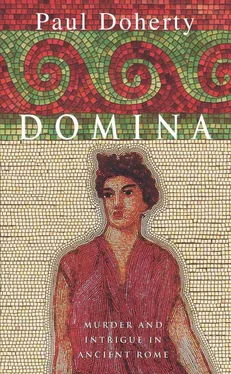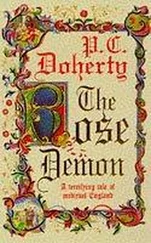Paul Doherty - Domina
Здесь есть возможность читать онлайн «Paul Doherty - Domina» весь текст электронной книги совершенно бесплатно (целиком полную версию без сокращений). В некоторых случаях можно слушать аудио, скачать через торрент в формате fb2 и присутствует краткое содержание. Год выпуска: 2012, ISBN: 2012, Издательство: Headline, Жанр: Исторический детектив, на английском языке. Описание произведения, (предисловие) а так же отзывы посетителей доступны на портале библиотеки ЛибКат.
- Название:Domina
- Автор:
- Издательство:Headline
- Жанр:
- Год:2012
- ISBN:9780755350490
- Рейтинг книги:3 / 5. Голосов: 1
-
Избранное:Добавить в избранное
- Отзывы:
-
Ваша оценка:
- 60
- 1
- 2
- 3
- 4
- 5
Domina: краткое содержание, описание и аннотация
Предлагаем к чтению аннотацию, описание, краткое содержание или предисловие (зависит от того, что написал сам автор книги «Domina»). Если вы не нашли необходимую информацию о книге — напишите в комментариях, мы постараемся отыскать её.
Domina — читать онлайн бесплатно полную книгу (весь текст) целиком
Ниже представлен текст книги, разбитый по страницам. Система сохранения места последней прочитанной страницы, позволяет с удобством читать онлайн бесплатно книгу «Domina», без необходимости каждый раз заново искать на чём Вы остановились. Поставьте закладку, и сможете в любой момент перейти на страницу, на которой закончили чтение.
Интервал:
Закладка:
Nero and his mother, hand-in-hand, walked to the edge of the box, its front draped in purple and gold cloths. The crowd rose as one man and roared its salutation. Nero lifted his hand, and the cheering grew even more deafening. As Nero and Agrippina took their seats, throne-like chairs raised well above the rest, Nero signalled and down the alleyways trooped imperial slaves carrying barrels filled with gifts: necklaces and brooches, food and free tickets for future events. These were thrown into the air and Nero laughed to watch the crowd scrambling to grab as much as they could, pointing to where the crush was great. I later learnt that ten people had been killed in the stampede.
Once Nero was settled, the magistrates, principal senators, leading Vestal Virgins, courtiers and their ladies garbed in silk and adorned with jewels, entered the box. These were followed by Nero’s special guests for the day who included the imperial physician, Xenephon of Cos, and the poisoner Locusta, both looking nervous and ill at ease. I knew that Agrippina hadn’t invited them, but Seneca, seated at the Emperor’s left, looked round specially as if he wanted to ensure that they were present. When Nero was distracted, deep in conversation with a Senator, I managed to catch Agrippina’s eye and indicate the two arrivals to her. Agrippina, her black hair hidden by a silver coronet to which a veil was attached, looked a little concerned but dismissed the new arrivals.
‘Why should Xenephon not be present?’ she whispered. ‘Although I admit I did pay Locusta to leave Rome and not return.’
She could say no more. An official had entered the arena and threw a roll of scarlet cloth up into the air. It spread out like a spurt of blood before floating down on the smooth raked sand. Trumpets brayed, the crowd roared its approval and the games began.
First came the usual blood-letting, an hors d’oeuvre to whet the appetite before the main meal was served. A group of condemned criminals, lashed to ‘T’-shaped crosses on mobile platforms, were wheeled into the amphitheatre. All were women, naked, their chins resting on the cross beams and their arms lashed beside them, leaving them free to move their hands. They reminded me of pinioned birds. The crowd pelted them with whatever they could lay their hands on, and soon the gold-silver sand was filthy. From the cross, in front of each victim, hung a dirty, cracked cup, the symbol of a convicted poisoner. I moved in my seat. Seneca turned to glance sideways at Nero and I caught the smirk on his face. Again the trumpets brayed. Wild, starving animals smoked from their cages, she-bears and tigresses, burst into the arena. For a while all was confusion, as a tigress attacked a bear and the most hideous, bloody struggle ensued. The condemned criminals, terrified of what was about to happen, screamed for mercy, drawing the attention of the animals to themselves. The tigress, having severely mauled the bear, turned and sprang at one victim, attacking her from the back, biting deep into her neck. The rest immediately joined in. I knew that the spectacle of poisoners, all of them women gathered from the prisons of Italy, being attacked by she-animals would jog memories and soon scandalous comparisons would be drawn. I recognised the vengeful hand of Narcissus proclaiming that this was how Rome dealt with poisoners. Agrippina appeared unperturbed, more interested in the report she had brought with her, studying the rolls of documents, as if she was in the imperial chancery rather than at a bloody spectacle.
I disappeared into one of the passageways for a while, until the roar of the crowd told me the wild animals had completed their task. By the time I returned to the box, the bloody remains of what was left on each platform had been wheeled away. Slaves, wearing grotesque masks, were clearing the offal. Fresh sand was strewn and raked, as Nero and the imperial party were served refreshments of iced wine and cold fruits. After this, the second session began, and a flock of Moroccan peacocks were released into the amphitheatre. A master archer, using curved tipped arrows, let loose at them, taking off each head with one well-aimed arrow. The decapitated birds, blood spurting, would continue to run for a while to the approval and pleasure of the mob. At last the whole flock were dead, and the archer approached the imperial box to receive his reward. Narcissus must have paid his claques well, as from every corner of the amphitheatre the cry rose up, ‘Save the feathers! Save the feathers! Use them at dinner time!’
I glanced across to see that Xenephon looked worried and Locusta had put her head down. Agrippina, however, was laughing and clapping her hands. She was sharp enough to realise the story was already round Rome and it would be better to appear unconcerned. She clapped her hands and the crowd imitated her. Seneca rather than Narcissus seemed to be in charge, and I saw him make a cutting movement with his hand. The trumpets brayed and another pantomime, of monkeys dressed as Amazons, either riding or perched in chariots pulled by goats, entered the arena. Nero roared with laughter, put one arm round his mother’s shoulder and pointed out what he thought was particularly funny. Seneca sat slumped in his chair. Again I realised, what the crowds would be whispering once the games were over: Claudius had been regarded as an old goat, and the monkeys were supposed to be the coterie of women who surrounded him, which included Agrippina.
Once the monkeys and goats had left the arena, it was time for the real games to begin. The fight was to be between the retiarii, net men, and Thracians. The gladiators filed into the arena and saluted the Emperor. It was only when the fight began that the mob realised these were not ordinary gladiators, but women. At first the crowd took this with humour but when the women proved to be poor fighters, the joke turned sour, and the crowd pelted them with rotten fruit. The lanistae came into the arena to lash at the fighters and ensure a proper combat. The odds in such fights were heavily weighed in favour of the nets: another powerful reminder of Claudius who had hated this imbalance. By the late afternoon the games were finished, and the mob, fickle as ever, saluted Nero and his mother. It might be considered that Narcissus had achieved his revenge, but the day’s events were not yet finished.
Nero took his guest up to the Palatine Palace where the dining hall had been specially transformed. A broad, golden awning shaped in the form of a mushroom hung down from the ceiling, and mushrooms fashioned out of silver and peacock feathers decorated the wall. The same motif was found on the tables, where knives, spoons and tooth picks were all embellished with the same theme. The guests took their seats, and were served with honey wine. The allusions continued as the meal continued. First came roast kid, served with slices of pumpkin, Seneca’s nickname for Claudius, in his bitter satire, which was a punning reference to his gaseous stomach and unfortunate habit of breaking wind at table. Then came fruits from the island of Cos, the birthplace of the physician Xenephon, which were served by the four women who had accompanied Claudius to his last meal. Roast peacock was brought in by slaves disguised as silver skeletons and finally, of course, came dish after dish of mushrooms served in a wide variety of sauces.
‘Mushrooms are the food of the Gods!’ Nero exclaimed, raising his goblet to his mother.
She toasted him back, so immersed in her son’s glory and favour, that she failed to appreciate the barbed witticisms and pointed reminders of how her husband had been helped into the Hall of the Gods. The high point of all this punning farce was a huge concoction of red confectionery, shaped in the form of a man’s buttocks, penis and testicles. This was served on a great silver platter taken round the guests by four Nubians, before being placed in the centre of the table. The buttocks were smacked by a female slave and the chef had arranged the confectionery so that it squeaked as if emitting a fart. The guests, their bellies soaked in wine, roared their applause. They watched gleefully as another female slave began to stroke the penis until it split, spouting out thick, white cream all over her. She was then summoned by different guests who scooped it from her skin with spoons or even their tongues. After the meal, a troupe of actors presented a burlesque scene of an old man, nicknamed the Pumpkin, who was frightened of mushrooms and peacock feathers. Everyone laughed, including Agrippina. Seneca was lounging on his couch, next to his personal guests, an old banking friend called Serenus and a beautiful young woman with a dark, oval face, pouting red lips, and hair arranged in black ringlets. I caught my breath and stared again, ignoring the pantomime and shouts of laughter.
Читать дальшеИнтервал:
Закладка:
Похожие книги на «Domina»
Представляем Вашему вниманию похожие книги на «Domina» списком для выбора. Мы отобрали схожую по названию и смыслу литературу в надежде предоставить читателям больше вариантов отыскать новые, интересные, ещё непрочитанные произведения.
Обсуждение, отзывы о книге «Domina» и просто собственные мнения читателей. Оставьте ваши комментарии, напишите, что Вы думаете о произведении, его смысле или главных героях. Укажите что конкретно понравилось, а что нет, и почему Вы так считаете.












